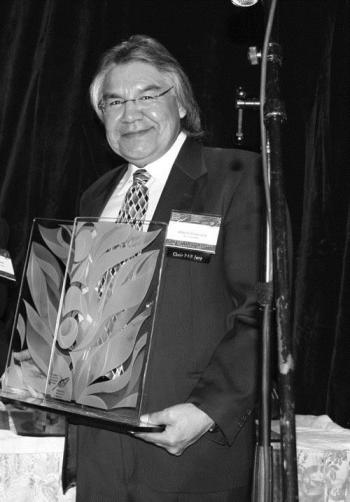Summary
By Dianne Meili
Windspeaker.com ARCHIVES
Living shoulder-to-shoulder with three other families on the trapline from September to March taught Albert Diamond about equality.
The president of Air Creebec Inc., who passed away suddenly from a heart attack on Sept. 9, 2009 at age 58, carried his childhood values into the boardroom to establish unprecedented economic success for Northern Quebec Cree.
The traditional values of caring and sharing, responsible for the fact "there were never really any arguments" and "everyone depended on each other" during the fall and winter cycle, are the same ones Diamond touted in speeches to global organizations that continually sought his advice.
"One of our best values is to share," he said in a video on the Grand Council of the Crees Web site. "And in business, health issues, or anything, if we (James Bay Cree) have knowledge, we'll share it with other communities when they ask."
"I learned early on, if I don't have the resources, not to be afraid to go to the people who do," he added.
Diamond was the first to admit he was not always a traditional person. He was away from home in Moose Factory for schooling 10 months of the year from the age of six.
"I was assimilated into the non-Native culture," he explained, and though he yearned to be with his parents on the land while away at school, he found reason to value his education when he came home in the summertime.
"My dad, as the chief of our community, would have a suitcase of letters for us kids to translate when we got home. He told us 'I wish I could read and write and speak English. Then I could do more for our people.' Reading those letters, I could see the government wasn't giving him the time of day and he was frustrated."
Diamond recalled asking himself 'what do you have to do to make changes happen?' and deciding at a young age the answer was in education.
But in his second year of university, a call from his brother, Chief Billy Diamond, changed his life. Robert Bourassa had announced the James Bay Project and Billy was taking the government to court.
At a time when land claims and agreements were unheard of, the Cree won the case to protect their traditional way of life. In 1975, the James Bay Agreement was signed with Quebec and the Grand Council of the Crees was born.
"During the two-year period of negotiations, we tracked down Crees who had college educations and who could come and work for us," Albert Diamond said in his video. "And all this time I was thinking 'this sounds very familiar," because my father always tried to get people to work together'."
Diamond was elected by the chiefs to oversee management, investment and distribution of the money paid to the Crees under the agreement. From its inception in 1978 to 1990, as chairman of the Cree Board of Compensation, he made decisions that saw subsidiaries like Cree Construction, Air Creebec, Servinor and other business ventures flourish.
Under his leadership, the business volume of Creeco grew from $4 million to over $100 million, including $62 million from the Cree Construction Company.
Over the years he lent his expertise to direct ventures other than those with a financial focus, like the board of health and social services.
Despite the money, Diamond acknowledged his peoples' struggles with violence and drug and alcohol abuse.
"There has been a fast pace of change. Yes, we have the negative aspects that result from that, but we also have our own people to deal with it. We have Cree social workers. On the whole, our quality of life has improved and we have made room for sports arenas, gathering places and homes for the Elders."
Add to this a Cree school board where Cree language is taught exclusively during the first three years of a child's life, and wherein a mandatory four-week canoe expedition teaches students respect for the land, customs and traditions, and it is obvious Diamond had a hand in keeping his peers' priorities straight.
Air Creebec Inc. Chairman Jack Blacksmith worked alongside Diamond for almost 20 years.
"I am serious when I say no one will ever compare with Albert," Blacksmith said. "He was our "go-to" guy.
Whenever we had someone new and they wanted to get direction, off they'd go to Albert."
"It's not just anybody who can take three or four companies and totally turn them around. He made it work.
"He was always ready to share, and he was totally respected. His very large presence is gone, and he will be missed."

